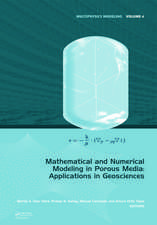Fast Fourier Transform and Convolution Algorithms: Springer Series in Information Sciences, cartea 2
Autor Henri J. Nussbaumeren Limba Engleză Paperback – sep 1982
Din seria Springer Series in Information Sciences
- 20%
 Preț: 337.66 lei
Preț: 337.66 lei - 18%
 Preț: 955.08 lei
Preț: 955.08 lei - 15%
 Preț: 646.62 lei
Preț: 646.62 lei - 20%
 Preț: 337.52 lei
Preț: 337.52 lei -
 Preț: 385.62 lei
Preț: 385.62 lei -
 Preț: 381.98 lei
Preț: 381.98 lei -
 Preț: 391.61 lei
Preț: 391.61 lei - 20%
 Preț: 324.64 lei
Preț: 324.64 lei -
 Preț: 380.84 lei
Preț: 380.84 lei - 18%
 Preț: 777.69 lei
Preț: 777.69 lei -
 Preț: 396.62 lei
Preț: 396.62 lei - 20%
 Preț: 330.75 lei
Preț: 330.75 lei -
 Preț: 382.57 lei
Preț: 382.57 lei - 15%
 Preț: 642.18 lei
Preț: 642.18 lei - 15%
 Preț: 640.06 lei
Preț: 640.06 lei -
 Preț: 387.58 lei
Preț: 387.58 lei - 20%
 Preț: 333.40 lei
Preț: 333.40 lei -
 Preț: 386.99 lei
Preț: 386.99 lei - 20%
 Preț: 653.71 lei
Preț: 653.71 lei - 15%
 Preț: 661.02 lei
Preț: 661.02 lei - 18%
 Preț: 1391.21 lei
Preț: 1391.21 lei - 15%
 Preț: 638.43 lei
Preț: 638.43 lei - 15%
 Preț: 642.68 lei
Preț: 642.68 lei -
 Preț: 386.00 lei
Preț: 386.00 lei - 20%
 Preț: 649.60 lei
Preț: 649.60 lei - 18%
 Preț: 950.21 lei
Preț: 950.21 lei -
 Preț: 393.35 lei
Preț: 393.35 lei - 20%
 Preț: 652.41 lei
Preț: 652.41 lei - 20%
 Preț: 645.65 lei
Preț: 645.65 lei -
 Preț: 390.25 lei
Preț: 390.25 lei -
 Preț: 387.96 lei
Preț: 387.96 lei - 15%
 Preț: 580.97 lei
Preț: 580.97 lei
Preț: 387.96 lei
Nou
Puncte Express: 582
Preț estimativ în valută:
74.24€ • 79.38$ • 61.90£
74.24€ • 79.38$ • 61.90£
Carte tipărită la comandă
Livrare economică 18 aprilie-02 mai
Preluare comenzi: 021 569.72.76
Specificații
ISBN-13: 9783540118251
ISBN-10: 354011825X
Pagini: 292
Ilustrații: XII, 276 p.
Dimensiuni: 155 x 235 x 15 mm
Greutate: 0.41 kg
Ediția:2nd corr. and updated ed.
Editura: Springer Berlin, Heidelberg
Colecția Springer
Seria Springer Series in Information Sciences
Locul publicării:Berlin, Heidelberg, Germany
ISBN-10: 354011825X
Pagini: 292
Ilustrații: XII, 276 p.
Dimensiuni: 155 x 235 x 15 mm
Greutate: 0.41 kg
Ediția:2nd corr. and updated ed.
Editura: Springer Berlin, Heidelberg
Colecția Springer
Seria Springer Series in Information Sciences
Locul publicării:Berlin, Heidelberg, Germany
Public țintă
ResearchCuprins
1 Introduction.- 1.1 Introductory Remarks.- 1.2 Notations.- 1.3 The Structure of the Book.- 2 Elements of Number Theory and Polynomial Algebra.- 2.1 Elementary Number Theory.- 2.2 Polynomial Algebra.- 3 Fast Convolution Algorithms.- 3.1 Digital Filtering Using Cyclic Convolutions.- 3.2 Computation of Short Convolutions and Polynomial Products.- 3.3 Computation of Large Convolutions by Nesting of Small Convolutions.- 3.4 Digital Filtering by Multidimensional Techniques.- 3.5 Computation of Convolutions by Recursive Nesting of Polynomials.- 3.6 Distributed Arithmetic.- 3.7 Short Convolution and Polynomial Product Algorithms.- 4 The Fast Fourier Transform.- 4.1 The Discrete Fourier Transform.- 4.2 The Fast Fourier Transform Algorithm.- 4.3 The Rader-Brenner FFT.- 4.4 Multidimensional FFTs.- 4.5 The Bruun Algorithm.- 4.6 FFT Computation of Convolutions.- 5 Linear Filtering Computation of Discrete Fourier Transforms.- 5.1 The Chirp z-Transform Algorithm.- 5.2 Rader’s Algorithm.- 5.3 The Prime Factor FFT.- 5.4 The Winograd Fourier Transform Algorithm (WFTA).- 5.5 Short DFT Algorithms.- 6 Polynomial Transforms.- 6.1 Introduction to Polynomial Transforms.- 6.2 General Definition of Polynomial Transforms.- 6.3 Computation of Polynomial Transforms and Reductions.- 6.4 Two-Dimensional Filtering Using Polynomial Transforms.- 6.5 Polynomial Transforms Defined in Modified Rings.- 6.6 Complex Convolutions.- 6.7 Multidimensional Polynomial Transforms.- 7 Computation of Discrete Fourier Transforms by Polynomial Transforms.- 7.1 Computation of Multidimensional DFTs by Polynomial Transforms.- 7.2 DFTs Evaluated by Multidimensional Correlations and Polynomial Transforms.- 7.3 Comparison with the Conventional FFT.- 7.4 Odd DFT Algorithms.- 8 Number Theoretic Transforms.- 8.1 Definition ofthe Number Theoretic Transforms.- 8.2 Mersenne Transforms.- 8.3 Fermat Number Transforms.- 8.4 Word Length and Transform Length Limitations.- 8.5 Pseudo Transforms.- 8.6 Complex NTTs.- 8.7 Comparison with the FFT.- Appendix A Relationship Between DFT and Conyolution Polynomial Transform Algorithms.- A.1 Computation of Multidimensional DFT’s by the Inverse Polynomial Transform Algorithm.- A.1.1 The Inverse Polynomial Transform Algorithm.- A.1.2 Complex Polynomial Transform Algorithms.- A.1.3 Round-off Error Analysis.- A.2 Computation of Multidimensional Convolutions by a Combination of the Direct and Inverse Polynomial Transform Methods.- A.2.1 Computation of Convolutions by DFT Polynomial Transform Algorithms.- A.2.2 Convolution Algorithms Based on Polynomial Transforms and Permutations.- A.3 Computation of Multidimensional Discrete Cosine Transforms by Polynomial Transforms.- A.3.1 Computation of Direct Multidimensional DCT’s.- A.3.2 Computation of Inverse Multidimensional DCT’s.- Appendix B Short Polynomial Product Algorithms.- Problems.- References.












